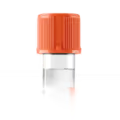Do I need a dsDNA antibody test?
Experiencing unexplained joint pain, persistent fatigue, skin rashes, or mysterious inflammation? Could your immune system be attacking your own DNA, and could testing help reveal what's happening inside your body?
dsDNA antibodies are proteins your immune system produces when it mistakenly targets your own double-stranded DNA. Elevated levels often signal lupus or other autoimmune conditions causing your symptoms.
Testing your dsDNA antibody levels gives you a vital snapshot of autoimmune activity in your body. It's the essential first step to understanding what's driving your pain and fatigue, so you can work with your doctor to personalize your treatment plan and reclaim your energy.
Method: FDA-cleared clinical laboratory assay performed in CLIA-certified, CAP-accredited laboratories. Used to aid clinician-directed evaluation and monitoring. Not a stand-alone diagnosis.

A derived biomarker is a value that is calculated from other directly measured biomarkers rather than being measured directly in the lab.
Get tested with Superpower
If you’ve been postponing blood testing for years or feel frustrated by doctor appointments and limited lab panels, you are not alone. Standard healthcare is often reactive, focusing on testing only after symptoms appear or leaving patients in the dark.
Superpower flips that approach. We give you full insight into your body with over 100 biomarkers, personalized action plans, long-term tracking, and answers to your questions, so you can stay ahead of any health issues.
With physician-reviewed results, CLIA-certified labs, and the option for at-home blood draws, Superpower is designed for people who want clarity, convenience, and real accountability - all in one place.
Key benefits of dsDNA antibody testing
- Confirms active lupus when your immune system attacks your own DNA.
- Spots disease flares early so treatment can start before organ damage occurs.
- Tracks lupus activity over time to guide medication adjustments and dosing.
- Flags kidney involvement risk, helping protect long-term kidney function.
- Clarifies unexplained joint pain, rashes, or fatigue in suspected autoimmune disease.
- Guides pregnancy planning by identifying higher-risk periods for lupus complications.
- Best interpreted alongside complement levels (C3, C4) and your current symptoms.
What is dsDNA antibody?
Your immune system mistaking your own DNA for a threat
dsDNA antibody (anti-double-stranded DNA antibody) is an autoantibody produced by your immune system that mistakenly targets the double-helix structure of your own DNA. Normally, immune cells generate antibodies to fight off foreign invaders like bacteria and viruses. In certain autoimmune conditions, this defense system malfunctions and creates antibodies against your body's own molecules.
A hallmark of lupus and immune system confusion
The presence of dsDNA antibodies is strongly associated with systemic lupus erythematosus (SLE), an autoimmune disease where the immune system attacks multiple organs and tissues. These antibodies can form immune complexes that deposit in kidneys, joints, and blood vessels, contributing to inflammation and tissue damage. Their levels often fluctuate with disease activity, making them both a diagnostic marker and a window into how actively the autoimmune process is unfolding.
dsDNA antibodies represent a fundamental breakdown in self-recognition, where the immune system loses its ability to distinguish "self" from "non-self."
Why is dsDNA antibody important?
Double-stranded DNA antibody (anti-dsDNA) is a highly specific autoantibody that signals your immune system is attacking the genetic material inside your own cells. It serves as a hallmark marker for systemic lupus erythematosus (SLE), a chronic autoimmune disease that can affect the kidneys, joints, skin, brain, and blood vessels. This test is typically negative in healthy individuals, and any positive result warrants careful clinical evaluation.
When the immune system turns inward
In most people, anti-dsDNA antibodies are absent or undetectable, which reflects normal immune tolerance. A negative result is reassuring and helps rule out active lupus in someone with vague symptoms like fatigue or joint pain. Low or borderline levels occasionally appear in other autoimmune conditions but lack the specificity seen in lupus.
What elevated levels reveal about disease activity
When anti-dsDNA levels rise, they often correlate with active lupus, particularly lupus nephritis, where immune complexes deposit in the kidneys and trigger inflammation. High titers can accompany flares marked by severe fatigue, butterfly-shaped facial rash, joint swelling, protein in the urine, and even neurologic or cardiac involvement. Women of childbearing age are disproportionately affected, and pregnancy requires close monitoring due to risks of preeclampsia and fetal complications.
Connecting antibodies to long-term outcomes
Anti-dsDNA levels help clinicians track disease progression and response to immunosuppressive therapy. Persistently high titers increase the risk of irreversible organ damage, especially in the kidneys and cardiovascular system, underscoring the importance of early detection and longitudinal monitoring.
What do my dsDNA antibody results mean?
Low or undetectable values
Low values usually reflect the absence of autoimmune activity directed against double-stranded DNA. This is the expected state in healthy individuals and indicates that the immune system is not producing antibodies that target the body's own genetic material. Undetectable or very low levels are reassuring and consistent with normal immune regulation.
Optimal range
Being in range suggests that your immune system is not generating antibodies against your own DNA. Most laboratories report dsDNA antibodies as either negative or below a defined threshold, typically less than 10 to 30 international units per milliliter depending on the assay. This reflects stable immune tolerance and the absence of systemic autoimmune inflammation, particularly the kind seen in lupus.
Elevated values
High values usually reflect active autoimmune disease, most commonly systemic lupus erythematosus or SLE. Antibodies against double-stranded DNA are highly specific for lupus and often correlate with disease activity, especially inflammation of the kidneys known as lupus nephritis. Levels may rise during flares and fall with treatment or remission. Rarely, modest elevations appear in other autoimmune conditions or chronic infections.
Context and interpretation
Results should always be interpreted alongside clinical symptoms, other antibody tests, and markers of inflammation or organ involvement. Levels can fluctuate with disease activity, and a single test does not diagnose or rule out lupus on its own.

.svg)









.avif)
.avif)


